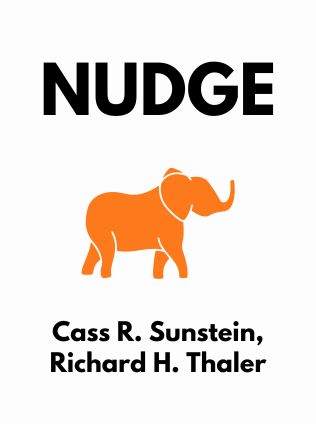
Nudge
Improving Decisions About Health, Wealth, and Happiness
By Cass R. Sunstein, Richard H. Thaler
Published 08/2021
About the Author
Richard H. Thaler and Cass R. Sunstein are distinguished figures in the realms of economics and law, respectively. Thaler, a professor at the University of Chicago, is renowned for his work in behavioral economics, which earned him the Nobel Prize in Economic Sciences in 2017. Sunstein, a Harvard Law School professor, has authored numerous books and articles, offering unique insights into law, public policy, economics, and psychology. Their collaboration in "Nudge" combines their expertise to explore how subtle interventions can significantly impact decision-making.
Main Idea
"Nudge: Improving Decisions About Health, Wealth, and Happiness" delves into the concept of "libertarian paternalism," a philosophy that suggests it is both possible and legitimate for private and public institutions to affect behavior while also respecting freedom of choice. The core idea is to design "choice architecture" in ways that nudge people toward better decisions without restricting their liberty. By understanding how people think and make decisions, we can create environments that guide them towards healthier, more financially secure, and overall better lives.
Table of Contents
- Introduction
- Biases and Blunders
- Libertarian Paternalism
- Choice Architecture
- Applications in Health, Finance, and Environment
- Objections and Misconceptions
- Conclusion: The Future of Nudging
Introduction
The introduction sets the stage by highlighting the pervasive nature of decision-making in our daily lives. Thaler and Sunstein introduce the concept of a "nudge" as any aspect of the choice architecture that alters people's behavior in predictable ways without forbidding any options or significantly changing their economic incentives. The authors emphasize the importance of designing environments that can help people make better choices, whether in health, finance, or personal development.
For example, the story of Carolyn, an imaginary school food service director, demonstrates how simply rearranging food displays in a cafeteria can influence students' food choices, increasing the consumption of healthier options. This example introduces the reader to the idea that small changes in context can have significant impacts on behavior.
Biases and Blunders
Thaler and Sunstein explore how cognitive biases and heuristics can lead people to make poor decisions. They discuss several key biases, including:
Sign up for FREE and get access to 1,400+ books summaries.
You May Also Like
The Subtle Art of Not Giving a F*ck
A Counterintuitive Approach to Living a Good Life
By Mark MansonRich Dad Poor Dad
What the Rich Teach Their Kids About Money - That the Poor and Middle Class Do Not!
By Robert T. KiyosakiHow To Win Friends and Influence People
The All-Time Classic Manual Of People Skills
By Dale CarnegieFreakonomics
A Rogue Economist Explores the Hidden Side of Everything
By Steven D. Levitt and Stephen J. Dubner



















